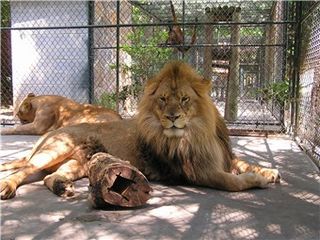The term "big cat" is typically used to refer to any of the five living members of the genus Panthera, namely the tiger, lion, jaguar, leopard, and snow leopard, as well as the non-pantherine cheetah and cougar.

Triangle Metro Zoo was a privately owned and operated 40-acre (16 ha) zoo that was open from 1998 until 2006. It was located in Wake Forest, North Carolina, United States.

Connecticut's Beardsley Zoo, located in Bridgeport, Connecticut, is the only Association of Zoos and Aquariums (AZA)-accredited zoo in the state of Connecticut. The zoo includes one of the few carousels in the state. The zoo has around 500 animals, from over 100 species, and welcomes about 280,000 visitors a year.

Animal captivity is the confinement of domestic and wild animals. More specifically, animals that are held by humans and prevented from escaping are said to be in captivity. The term animal captivity is usually applied to wild animals that are held in confinement, but this term may also be used generally to describe the keeping of domesticated animals such as livestock or pets. This may include, for example, animals in farms, private homes, zoos, and laboratories. Animal captivity may be categorized according to the particular motives, objectives, and conditions of the confinement.
Forest Animal Rescue by Peace River Refuge and Ranch is an American nonprofit wildlife sanctuary in Florida.

Austin Zoo is a non-profit rescue zoo and located in southwestern unincorporated Travis County, Texas, United States, west of Austin. The zoo is accredited by the Zoological Association of America.

The Wildheart Animal Sanctuary, previously known as the Isle of Wight Zoo and Sandown Zoo, is a wildlife sanctuary on the coastline of Sandown, Isle of Wight. The Isle of Wight Zoo was privately owned, but it became a charitable trust in 2017 and was renamed as the Wildheart Animal Sanctuary in 2021. The Sanctuary is "dedicated to rescuing exotic animals from harm and rehabilitating them in their forever home".

Chipangali Wildlife Orphanage is a not-for-profit organisation dedicated to the rescue and care of orphaned, injured, abandoned, abused or confiscated wild animals in southern Africa. It is located in Bulawayo, Zimbabwe.

Kamo Wildlife Sanctuary is a privately owned zoo located near Kamo, Whangarei, New Zealand. The facility houses a collection of two species of large cats and was formerly used as a location for the filming of the television series The Lion Man.

Parc des Félins is a zoological park in France dedicated to the breeding and conservation of wild members of the cat family. It is located in the commune of Lumigny-Nesles-Ormeaux in Seine-et-Marne, about 53.6 km (33.3 mi) southeast of Paris.

Tiger attacks are a form of human–wildlife conflict which have killed more humans than attacks by any of the other big cats, with the majority of these attacks occurring in Bangladesh, India, Nepal and Southeast Asia.
Turpentine Creek Wildlife Refuge (TCWR) is a 459-acre wildlife refuge for abused, abandoned, and neglected big cats.

The Exotic Feline Rescue Center (EFRC) is an American exotic feline preserve established in 1991 and located in Center Point, Indiana.

The Wild Animal Sanctuary is a 1,214-acre (491 ha) animal sanctuary in Keenesburg, Colorado, United States. The sanctuary specializes in rescuing and caring for large predators which are being ill-treated, for which their owners can no longer care, or which might otherwise be euthanized. It is a 501(c)(3) nonprofit organization and a state and federally licensed zoological facility.
Tiger Haven is a non-profit 501(c)3 sanctuary for big cats in Roane County, Tennessee. The sanctuary has been in operation since September 1991.

Big Cat Rescue Corp., also known as BCR and previously known as Wildlife on Easy Street, Inc., operates an animal sanctuary in Hillsborough County, Florida, United States, which rescues and houses exotic cats, and rehabilitates injured or orphaned native wild cats. It was founded by Don Lewis and Carole Baskin in 1995.
The Phnom Tamao Wildlife Rescue Centre is a wildlife centre located roughly 25 miles (40 km) by road south of Phnom Penh, Cambodia. The centre was established in 1995 and with an area of over 6,000 acres of protected regenerating forest, this is the largest zoo in Cambodia. Since 2001, PTWRC has been run by the government institution of Cambodian Forestry Administration in partnership with an environmental non-profit organization called Wildlife Alliance. Wildlife Alliance animal husbandry specialists, veterinarians, and care takers assist in the feeding and care of animals and operations. PTWRC currently houses over 1,200 rescued animals from 102 species including endangered Asian elephants, tigers, Pileated gibbon, Siamese crocodile, Malayan sun bears, among many others. Many of the species are listed as Endangered or Vulnerable by the International Union for Conservation of Nature (IUCN).















